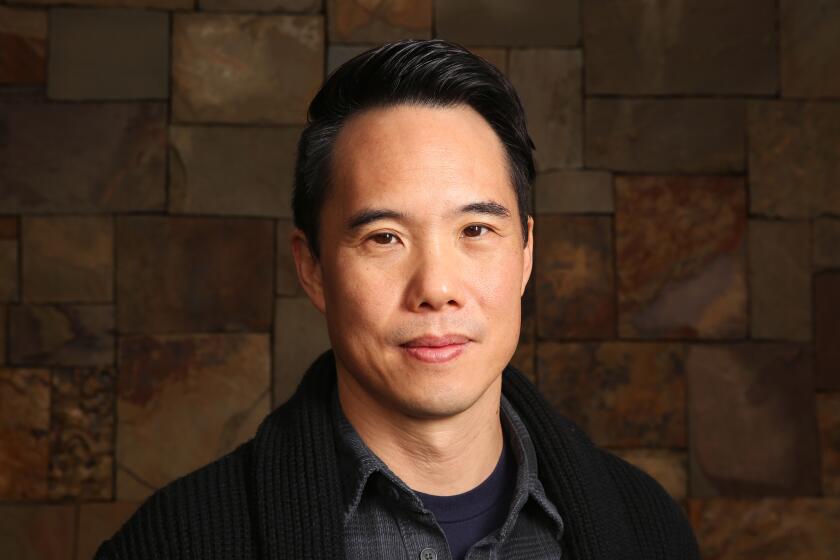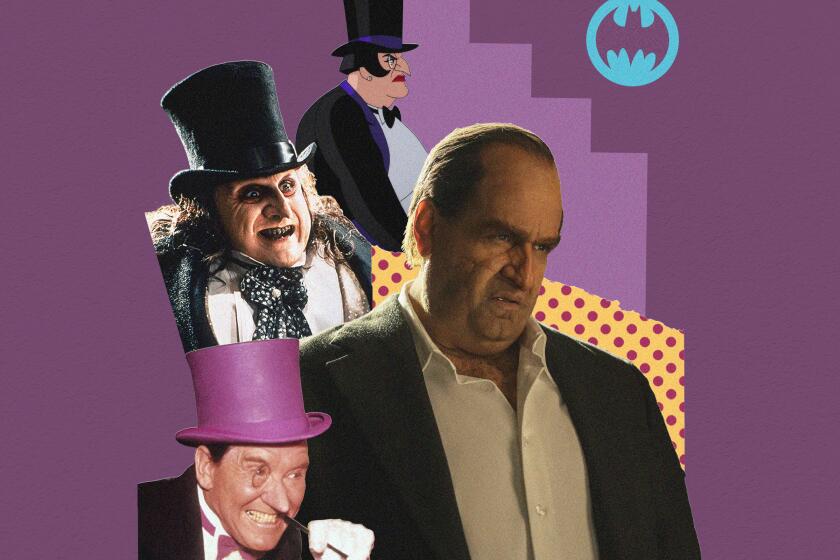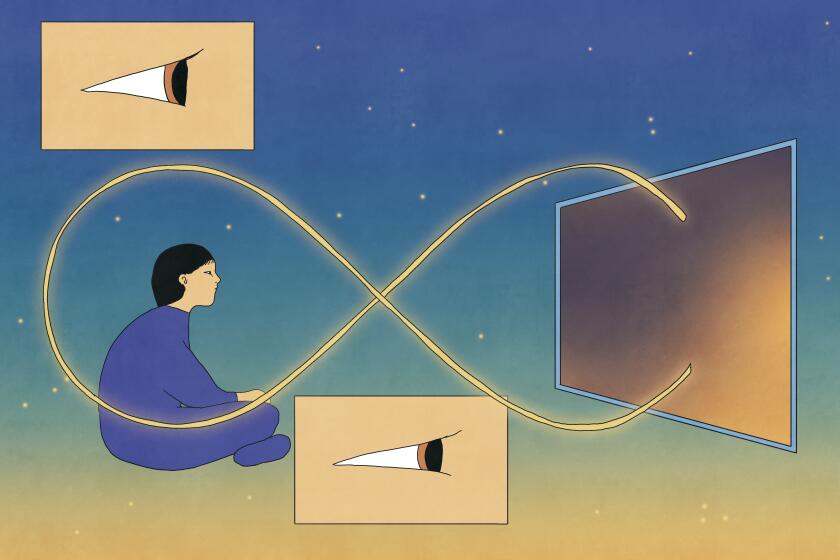
- Share via
To help him prepare for his role as an overlooked Asian American everyman in “Interior Chinatown,” Jimmy O. Yang bought a $1,500 used Toyota Corolla and drove it around Los Angeles.
It was, to put it mildly, a lemon: The driver’s side door didn’t work. There were no power windows. The brakes were so shot that he once struggled to stop in time and bumped into a Tesla whose owner was irate — until he recognized Yang and asked to get cast in one of his shows.
But the most telling encounter, said Yang in a recent Zoom from his home in Los Feliz, was when he pulled up to the studio gate and the guard on duty refused to let him on the lot.
“I’m No. 1 on the call sheet and she would not give me the time of day. She was like, ‘Pull over, call whoever got you in here. If you can’t, you gotta go’ — she was so rude to me because I was in this car,” recalled the actor-writer-comedian.
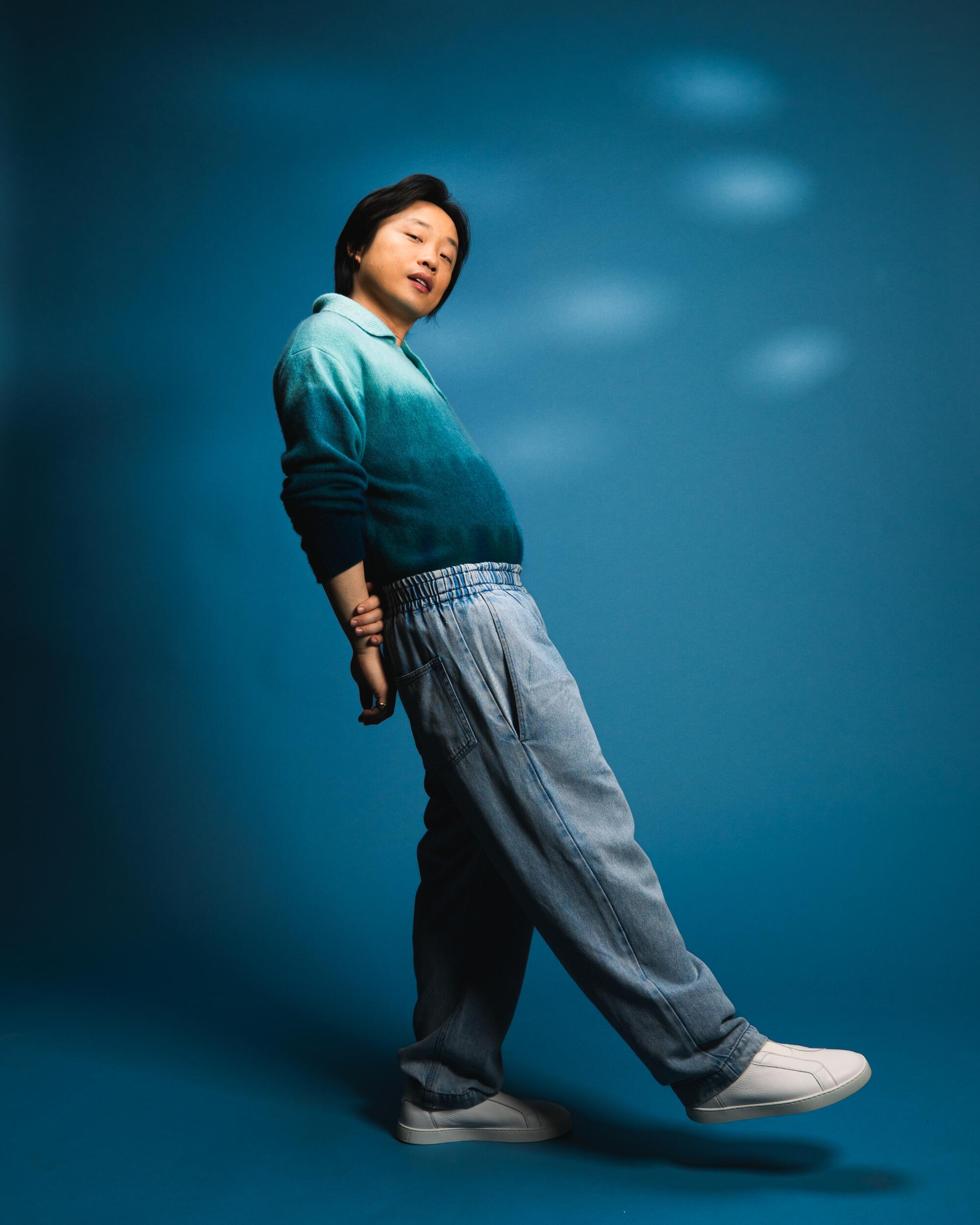
The experience gave Yang a sense of how people tend to dismiss Asian Americans, especially those who exist on the economic margins. “It’s sad, and it informed a lot of my decisions on the show,” he said.
In the surreal “Interior Chinatown,” which Yang aptly describes as “‘The Twilight Zone’ meets ‘Law & Order,’” Yang stars as Willis Wu, a waiter at a seedy Chinese restaurant that doubles as the perpetual filming location for a police procedural called “Black & White.” Willis laments feeling like “a background actor in someone else’s story” and longs to be in the spotlight, “but that’s hard if you look like me,” he says. Then he witnesses a crime, and suddenly finds himself thrust into the center of the story. Premiering Nov. 19 on Hulu, the 10-episode series was created by Charles Yu and adapted from his National Book Award-winning novel of the same name, a moving, inventive send-up of Asian stereotypes in pop culture.
Willis’ journey “is such a metaphor for the Asian American experience,” Yang said, “because we are the model minority, but at the same time we are invisible. People talk about Black and white, but where do we fall? You’re just not seen for who you are.” He cites the example of a British TV host who approached Lisa Su, the billionaire chief executive of Advanced Micro Devices, for an interview and asked if she spoke English. “He just assumed she was a foreigner.”
Charles Yu, the National Book Award-winning author of ‘Interior Chinatown,’ joins the L.A. Times Book Club in a chat with film critic Justin Chang.
“Interior Chinatown” represents a breakthrough dramatic role for Yang, who is perhaps best known for his scene-stealing turn as Jian-Yang, a quietly menacing Chinese app developer in the HBO comedy “Silicon Valley,” and for stand-up specials like Prime Video’s “Good Deal” and “Guess How Much?”
It is also a deeply personal project with striking parallels to his own life story, as an immigrant who moved to the United States from Hong Kong as a teenager and spent years toiling away in bit parts — “Chinese Teenager #1,” “Person in Line” — until he attained leading-man status.
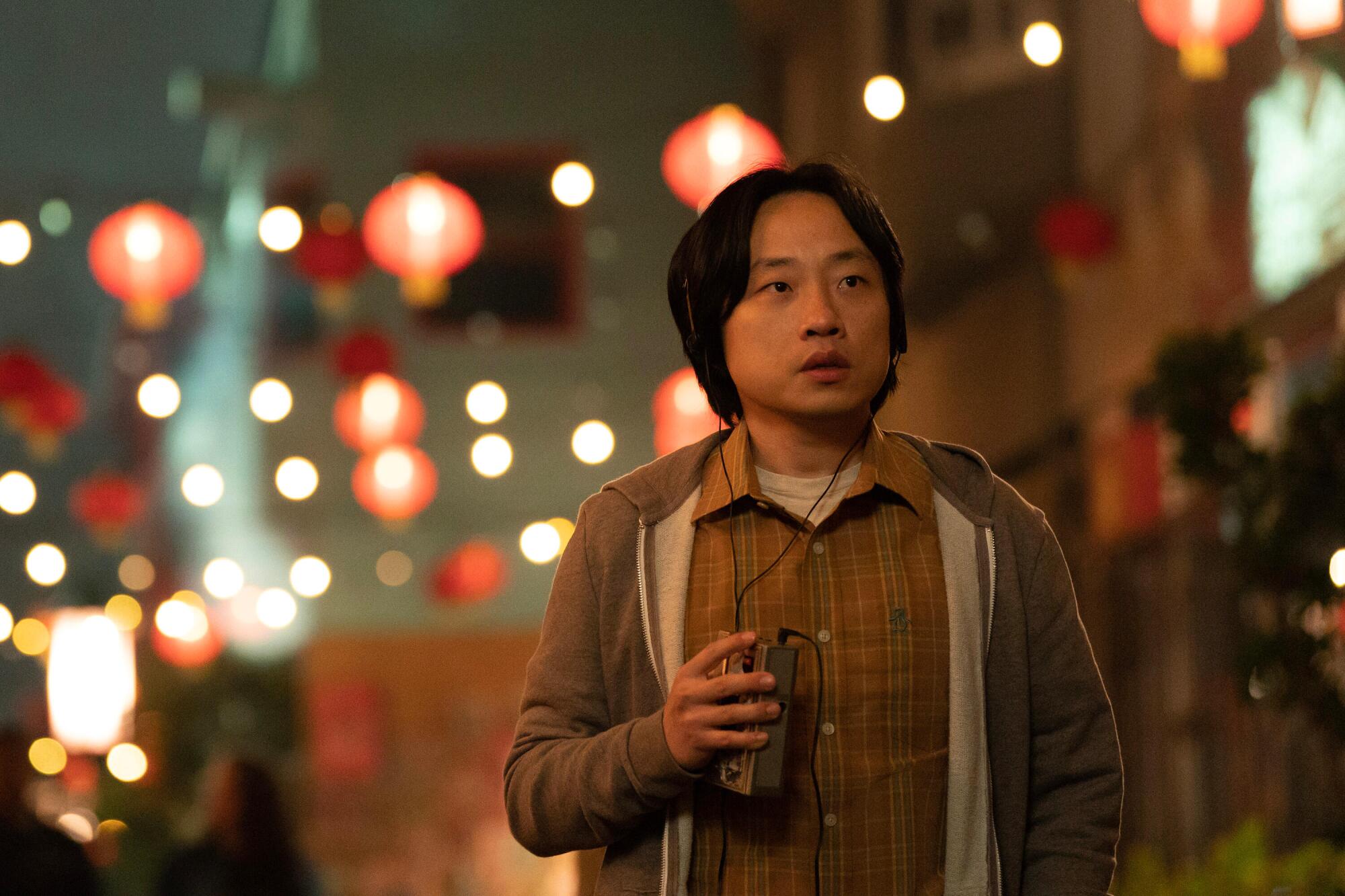
“Emotionally, I always connected with Willis,” Yang said. “At the same time, I think it’s a universal story. I’ve never felt like I fit in, not just because I’m Asian — that’s part of it — but also because I grew up in a pretty traditional family that wanted me to get a real job, and I wanted to be an artist.”
Yang relocated to Los Angeles when he was 13 — a delicate age for anyone, much less a recent transplant with a tenuous grasp on the language. The culture shock was intense.
“I didn’t know what a Super Bowl was,” he said.
In the locker room at school, he was teased for wearing tighty whities instead of boxers. His peers could dunk basketballs and had mustaches; he was in eighth grade but had barely hit puberty. “My goal was to just assimilate so I don’t get made fun of,” Yang remembered.
Among the shows our TV writers are looking forward to this season are ‘The Golden Bachelorette,’ ‘Matlock,’ ‘St. Denis Medical’ and ‘Landman.’
Using a fake address, Yang enrolled at Beverly Hills High School. (His family soon moved to what he recalled as “the crappiest apartment in Beverly Hills,” on the edge of the district.) He cultivated a diverse group of friends and immersed himself in American pop culture — especially BET and “The Simpsons.” He loved hip-hop but couldn’t rap, so Yang got a software program called Fruity Loops and made beats — sometimes incorporating his violin.
Then, as now, he had a strong urge to create. “When I’m at a restaurant, I will fold up the chopstick wrapper and build a little fort with the plates and chopsticks and, like, make stuff in my hands,” he said.
His parents wanted him to do something practical, like become an accountant. “I don’t think they were, like, anti-art by any means,” Yang said. “My dad probably wishes he could have been an actor or a musician. It just truly wasn’t a real job for him. He wanted me to be financially stable, and not be homeless.”
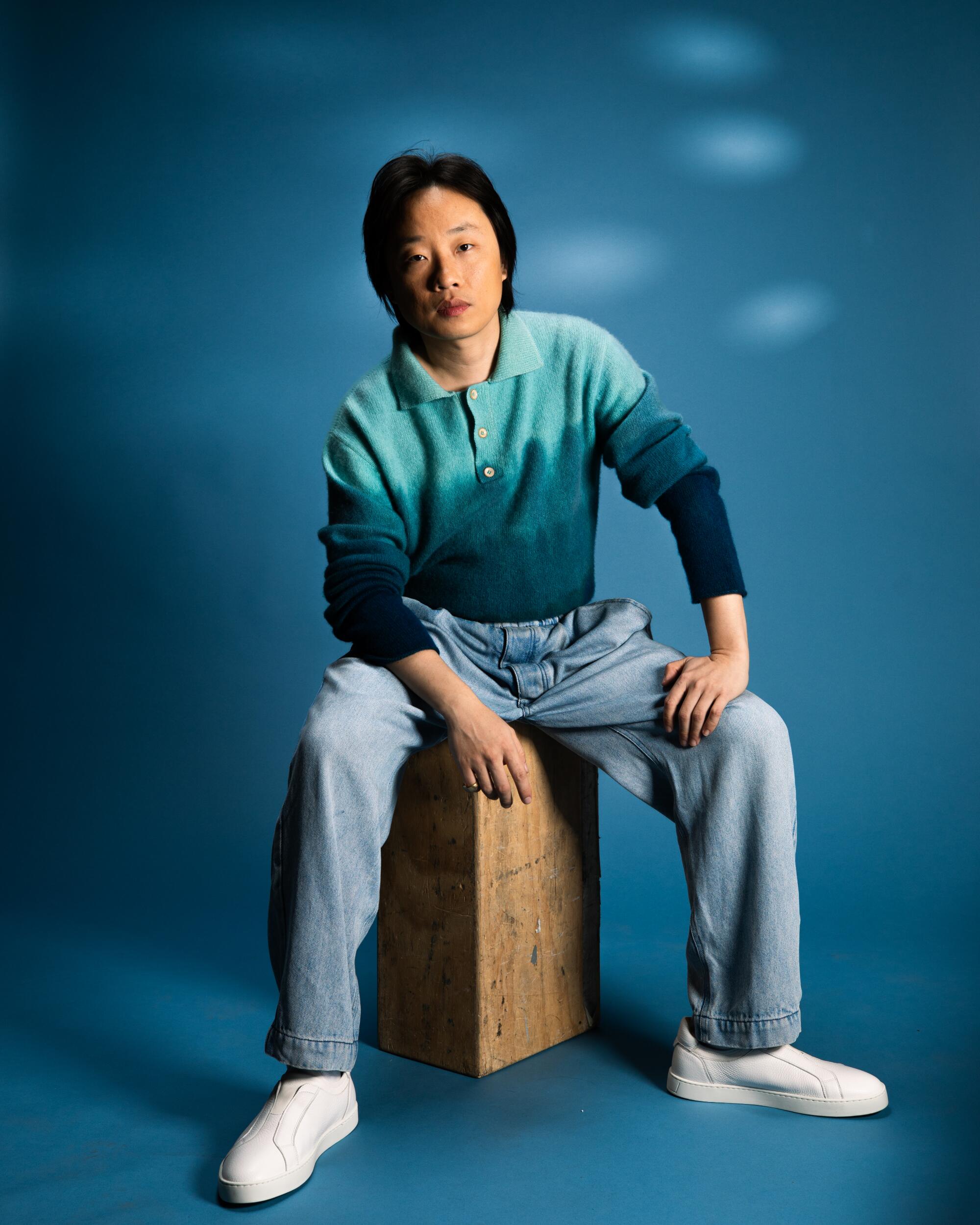
As Yang was preparing to graduate from the University of California San Diego, and panicking about his future, he tried doing stand-up at an open-mic night at the Haha Club in North Hollywood. It was a “holy s— moment,” he recalled. “My material sucked but I was more comfortable onstage than off-.” He was instantly hooked and started going as much as possible. (He said the club’s owners still have him saved in their phone as “Open Mic Jimmy.”)
Stand-up became his informal writing, acting and directing school. “You just learn so much. There’s no more honest feedback than laughter from a real audience — or lack thereof.”
He worked a string of odd jobs, from selling used cars to DJing at a strip club where, according to house rules, every third song had to be “Girls, Girls, Girls” by Mötley Crüe. The sound of revving motorcycles “still haunts me to this day,” he said.
Yang started doing background work and eventually landed small speaking roles. There were many moments when, like Willis in “Interior Chinatown,” he was reminded of his place in the Hollywood pecking order. On the set of the ABC series “Agents of S.H.I.E.L.D.,” when he had a few lines of dialogue as the aforementioned “Chinese Teenager #1” in an episode set in Chinatown, he went to get a soda from craft services and was stopped by a crew member. “She was like, ‘Oh, I thought you were one of the background actors,’ because I was Chinese,” he said.
What makes the Penguin an iconic character? The creators of HBO’s ‘Penguin’ and a DC comic book writer explain his enduring appeal.
Yang eventually was cast in “Silicon Valley” in what was originally written as a one-off guest role but became a series regular. From the beginning, he elevated what, in less capable hands, could have played as a one-note cliché.
“Jimmy quickly showed himself to be a really great comedy actor. He understood the joke but played it very real and never seemed like he was reaching for the comedy or trying to be funny,” “Silicon Valley” creator Mike Judge told The Times in an email.
Yang, who speaks three Chinese dialects — Cantonese, Shanghainese and Mandarin — decided that Jian-Yang was probably from mainland China and likely would speak with a Mandarin accent. “If you’re going to do an accent, you’ve got to do it specifically,” he said.
“I remember watching it as a fan and just being like, ‘Who is this?’” said Yu, who, in addition to being a novelist, is a TV writer with credits on such mind-scrambling shows as “Westworld” and “Legion.” “There was a lot of discussion, maybe even controversy, about the character and whether it played into stereotypes. But what got me about that was he sounded like people that I’ve heard.”
“Silicon Valley” also became a training ground for Yang, who starred opposite seasoned improvisers like Zach Woods and Thomas Middleditch. “I learned that if I don’t listen and pay attention, and I’m just thinking about my next line, I am going to be lost. It was a great lesson,” he said.
Judge was impressed by the calm strength Yang brought to his character, which made Jian-Yang a great foil for the rest of the cast, particularly the bombastic Erlich Bachman (T.J. Miller). “[Miller] was always kind of shaking everyone up and could be really overbearing,” Judge said. “Jimmy never let it get to him, which ended up creating a great dynamic between the two of them that we started writing to.” At one point, there was even talk of an Erlich-Jian-Yang spinoff.
When a TV show or other forms of art run long, they can be worth our time, our television critic writes. But in some cases, abbreviation is best.
Other opportunities soon followed. In 2018, Yang published a memoir, “How to American: An Immigrant’s Guide to Disappointing Your Parents.” The same year, he played the extravagant Bernard Tai in “Crazy Rich Asians,” a film that marked a watershed for Asian representation in Hollywood. “I was usually the only Asian on set, right? So to have everyone so beautiful from all over the world, it was like the Asian ‘Avengers,’” he said. “Everyone who met on that set, we are all still best friends. We make each other feel seen.
“I always had this ignorant optimism about me,” Yang said of the industry’s track record when it comes to the AAPI community. “If I botched an audition, I never blamed the fact that they weren’t looking for an Asian actor. It didn’t deter me. But looking back, we had very limited opportunities. Since ‘Crazy Rich Asians,’ I think there’s more.”
Success has meant that Yang has made his father, Richard Ouyang, proud — and even helped him score some acting gigs, including a recent car commercial starring both of them. “They always say ‘nepo baby.’ I like to think he’s the nepo daddy in this family.”
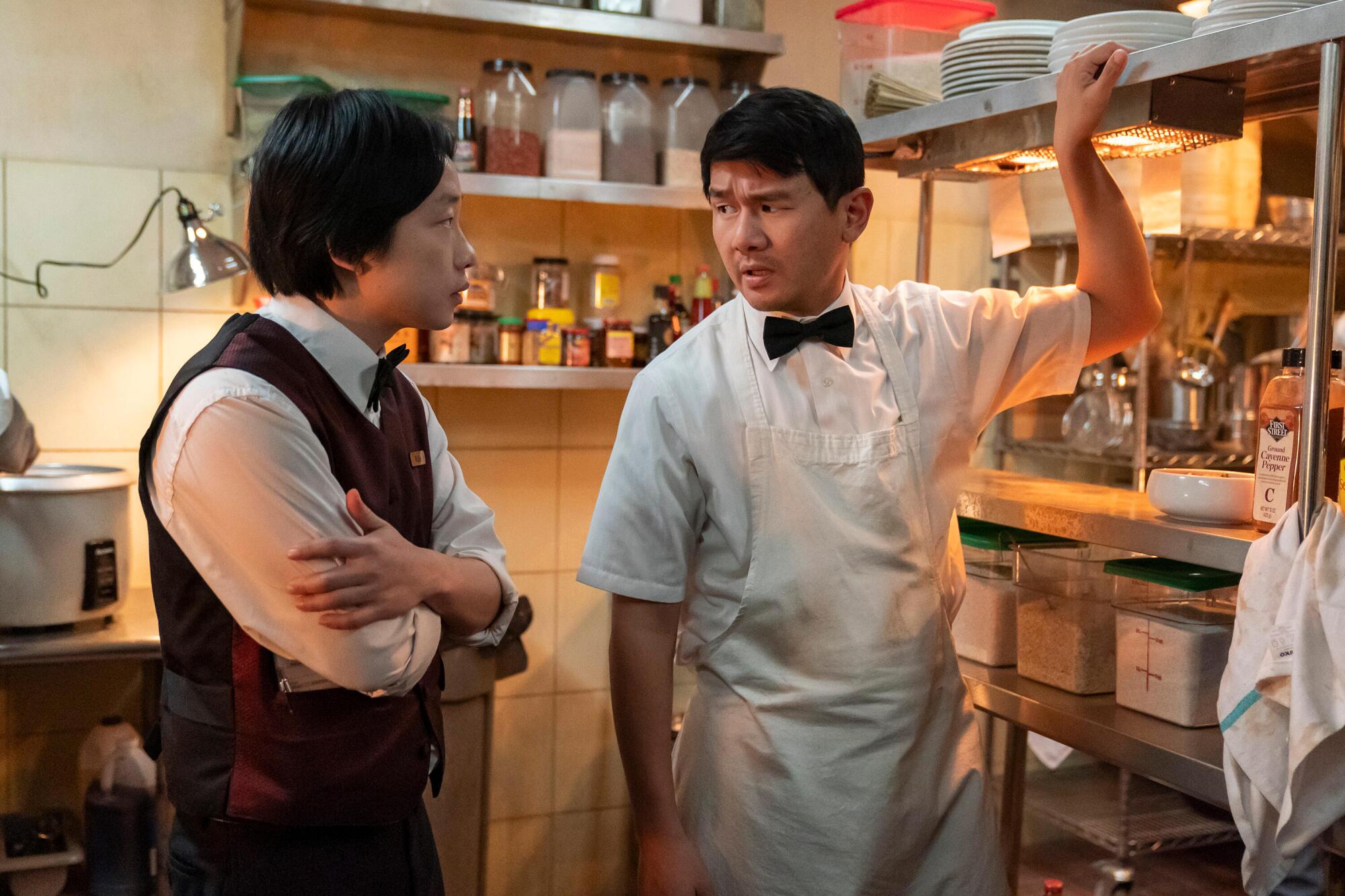
When Yang got the call to audition for “Interior Chinatown,” he felt an immediate connection to the role. “I was like, ‘I gotta get this. This means so much to me,’” he said.
Yu said both the novel and series were inspired by “people who have these backstories, but they don’t get to tell those stories.” When it came to casting Willis, Yang was an intriguing choice because he’d followed such a similar journey. “There honestly aren’t many people out there that have had that kind of career path, to start as a featured extra and grow into a phenomenon on ‘Silicon Valley’ where people were quoting his character’s lines,” Yu said.
Yu recalled being “knocked back” by the emotional weight — and the tears — that Yang delivered in his audition. “I was — I don’t want to say surprised, because it sounds like I wasn’t expecting him to do well — but it’s not something you expect from this guy who just made you laugh for years,” said Yu, who sees a connection between Yang’s multilingual, multicultural background and his natural facility for acting.
For Yang, finally being No. 1 on the call sheet was a challenge — albeit a welcome one.
“It was six months of shooting. I was basically in every scene. I had to be funny on Tuesday, do kung fu on Wednesday and cry on Friday. It was very grueling,” Yang said. “But of course, it’s a beautiful story worth telling.” He admits there were moments he was jealous of his friend and co-star, Ronny Chieng, who provides comic relief as a hapless busboy named Fatty Choi.
But for better or worse, Yang’s sidekick days seem to be over.
In addition to “Interior Chinatown,” he’s developing a few projects through Crab Club, the production company he founded with writers and producers Jessica Gao, creator of “She-Hulk: Attorney at Law,” and Ken Cheng, co-writer of 2022’s “Easter Sunday.” (The name is a nod to their fondness for sitting around eating Dungeness crab together.) He’s also looking forward to doing more stand-up at larger venues, including the Kia Forum in Los Angeles in February.
In the short term, though, he’s focused on winning his fantasy football league. “That is the most important goal right now.”
More to Read
The complete guide to home viewing
Get Screen Gab for everything about the TV shows and streaming movies everyone’s talking about.
You may occasionally receive promotional content from the Los Angeles Times.

